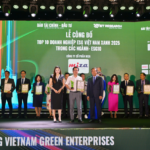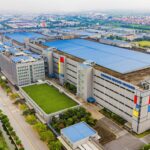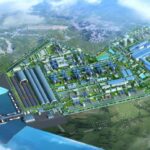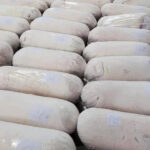According to the Vietnam Paper and Pulp Association, approximately 75-80% of the paper produced in Vietnam is recycled and made from recovered paper sources, with an annual total production of over 6,000,000 tons of recycled paper. Of this, about 50% is from imported sources and the remaining 50% is from domestic recovered paper. This highlights the significant potential of Vietnam’s paper industry in promoting a circular economy and efficient resource utilization.
SIGNIFICANT POTENTIAL IN RECYCLING
From 2024, according to the Law on Environmental Protection 2020, manufacturers and importers are mandated to implement Extended Producer Responsibility (EPR). EPR entails two key responsibilities: waste collection and treatment, and packaging and product recycling by manufacturers and importers. The responsibility for recycling has been in effect since January 1, 2024.
Previously, businesses voluntarily recycled waste from their products. Now, they are obligated to do so according to the methods and mandatory ratios stipulated by the law.
Consequently, the paper industry must comply with EPR. The implementation of EPR is expected to bring numerous opportunities for businesses, especially those involved in paper recycling.
At the seminar “Implementing Extended Producer Responsibility: Enhancing Environmental Protection in the Industrial Sector,” Mr. Luong Chi Hieu from the Research and Development Center of the Vietnam Paper and Pulp Association, shared that EPR will enhance waste collection, recycling, and consumption of products made from recycled materials. This, in turn, encourages investment in advanced recycling technologies to produce higher-value products.
As evidence of this development, Mr. Hieu cited, “Previously, businesses had a capacity of only about 2,000 to 10,000 tons of paper per year. However, many of our member companies now have a capacity of over 100,000 tons of paper per year. This is a significant advancement, demonstrating the effectiveness of investments in the industry.”
EPR also contributes to creating a sustainable value chain, connecting the links in the ecosystem from collection, sorting, treatment to recycling. Mr. Hieu illustrated this with an example of how used products, including paper, need to be collected, sorted, and recycled.

Among recovered paper products, there are various types such as old magazine paper (OMG), old newspaper (ONP), used office paper (OCC), mixed paper, and a large volume of used carton boxes (OCC) that are essential for commerce and e-commerce. Proper sorting of these paper types during collection is crucial for achieving efficiency in both business operations and product quality, as each type of paper has distinct characteristics and applications.
Additionally, EPR enhances the image of businesses, positioning them as responsible entities that actively contribute to the development of a green and circular economy. It also increases opportunities for businesses to enter international markets, particularly those with stringent environmental requirements, such as Europe and North America.
3 MAJOR CHALLENGES
While EPR presents numerous opportunities, businesses face several challenges during its implementation.
Mr. Luong Chi Hieu affirmed that the EPR mechanism is clearly defined in the Law on Environmental Protection 2020, along with Decree 08/2022 and Decree 05/2025 amending Decree 08. This clarity serves as a significant advantage.
However, there are three main difficulties that the paper industry is currently facing:
Firstly, the environmental protection deposit for importing recycled materials as production inputs is relatively high. According to Decree 08, if the import volume is below 100 tons, the deposit rate is 15%; for imports between 100 and 500 tons, it increases to 18%; and for imports exceeding 500 tons, the rate is 20%.
Mr. Hieu pointed out that this deposit rate is excessively high and poses a substantial financial burden on businesses. He added that, to date, the Vietnam Paper and Pulp Association has not received any reports or information regarding violations by enterprises in importing scrap as production inputs. Therefore, the necessity of maintaining such a high deposit rate is questionable.
Secondly, the import quota is evenly divided annually and does not consider market demand fluctuations. Mr. Hieu elaborated, “As entrepreneurs, we should be able to take advantage of favorable prices to import materials for production. However, if the quota for a year is fixed, we cannot import more. This challenge significantly limits the flexibility of businesses in optimizing material costs.”
Thirdly, the domestic collection system is still unprofessional and fragmented, lacking supportive policies for small-scale collectors. This hinders the efficiency of the domestic recycled material supply chain.
REDUCED DEPOSIT RATES AND SUPPORTIVE POLICIES FOR SMALL-SCALE COLLECTORS ARE NEEDED
To overcome these challenges and maximize the benefits of EPR, Mr. Hieu emphasized the crucial role of the government in providing a clear legal framework. He suggested the following:
Reduce the environmental protection deposit rate: Instead of the current 15-18-20% rate, a reduction to 5% is proposed for compliant businesses. For non-compliant enterprises, stricter penalties such as license revocation or import prohibition can be imposed.
Introduce flexibility in import quotas: Allow businesses a variation of approximately 20% in their annual import quota for recycled production materials. This empowers businesses to be more agile in importing materials when market prices are favorable.
Implement supportive policies for small-scale collectors: Specifically, permit businesses to pay taxes on behalf of small-scale buyers and sellers of paper waste, including 1% VAT and 0.5% corporate income tax. These tax amounts will be considered reasonable expenses when calculating corporate income tax for the businesses.
Additionally, authorities should consider piloting an increase in the value of the declaration form to up to 1 billion VND per person per year to meet the demands. In cases where commercial enterprises trading in recycled materials violate the law, they must take full responsibility.
On the business side, Mr. Hieu suggested optimizing the production process. Enterprises should conduct self-inspections to streamline production, conserve resources, and reduce emissions.
Businesses are encouraged to join EPR alliances in broader industries or within their specific sector, such as the EPR alliance in the paper industry. Developing an efficient system for collection, sorting, and recycling is also vital.
Investing in digitization, digital transformation, and artificial intelligence (AI) will enhance capabilities in management, production, and governance. This promotes transparency in tracing the origin and importing of materials, thereby increasing customer and partner trust.
The “Northern Industrial Hub” Gets 3 New Industrial Clusters Spanning 170 Ha with a Total Investment of Over VND 2,400 Billion
The three newly-established industrial clusters in Bac Ninh province boast a combined investment of over VND 2,400 billion.
Creating a Clear and Transparent Legal Framework for EPR Implementation
The challenges faced in implementing Extended Producer Responsibility (EPR) effectively include an inadequate collection and recycling infrastructure, high recycling costs, difficulties in domestic consumption of recycled materials, and unclear legal frameworks without proper monitoring mechanisms.




















